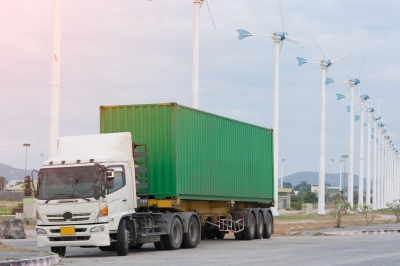The Confederation of Truckers Association of the Philippines (CTAP) is requesting the Department of Transportation to revoke a new department order that will effectively phase out trucks aged 15 years and above, asking instead that roadworthiness be the yardstick for vehicle registration and franchising.
“The roadworthiness of the vehicle should be the determining factor in the proper registration and issuance of the Certificate of Public Convenience (CPC) for TH (trucks for hire) Trucks and not its year model,” CTAP said in its position paper on Department Order (DO) No. 2017-09.
READ: DOTr order effectively imposes 15-year age limit for trucks
The position paper, a copy of which was obtained by PortCalls, was submitted and received by the transport department on July 28.
DO 2017-09, signed April 24 by Transportation Secretary Arthur Tugade, reinforces DO 2002-030 on the mandatory age limit for buses- and trucks-for-hire covered by CPC. But truckers said they secured copies of the new order only recently and that no public consultation or notice to stakeholders was made before the order was issued.
DO 2017-09 reiterates DO 2002-030 and “strengthens the policy on the mandatory fifteen (15) year age limit of public utility buses units or Trucks for Hire” that are covered by CPC. This will be enforced by requiring truckers to submit a certificate of date of manufacture from the original manufacturer, such as a sales invoice or other competent documents, to prove the age of a motor vehicle.
According to DO 2002-030, a unit that exceeds the minimum age, as specified by the time of expiration of the covering CPC, cannot file a new application for franchise, for extension of the validity of CPC, for substitution of unit, and for increase in the number of units.
The Land Transportation Office (LTO) and Land Transportation Franchising and regulatory Board (LTFRB) were supposed to issue a joint memorandum circular (JMC) within 30 days of effectivity of DO 2017-09 in order to implement the mandate of the policy within their respective jurisdictions, “taking into consideration a reasonable period for the smooth and proper implementation of this Department Order.”
Though the JMC remains unreleased, some truckers reportedly can no longer renew their CPCs for trucks beyond the age limit specified by DO 2017-09.
According to CTAP, “it appears that the DOTr policy on the 15 years age limit on TH Trucks blurs all the distinction between a roadworthy vehicle vis-à-vis dilapidated vehicle by focusing primarily on the age of trucks (commencing) from the date of its manufacture.”
Phasing out of older trucks has long been opposed by truckers, who insist that roadworthiness, not age, be the basis for securing a franchise.
CTAP said around 80% of cargo trucks currently in use to transport various types of goods and commodities are refurbished second-hand units age 15 years old and above.
The confederation noted that “by the innate Filipino ingenuity, though majority of our trucks are second-hand units, …in terms of (their) roadworthiness (they) remain practically equal with brand-new trucks.”
“Evidence of which is the continued trust and confidence reposed upon them by their respective clientele,” said CTAP, whose 15 member organizations have between them 9,100 truck units.
The confederation is requesting the revival of the Motor Vehicle Inspection Service (MVIS) in order for government to determine the roadworthiness and current status of a vehicle for the purpose of registration and issuance of CPC to trucks.
Industry killer
According to CTAP, the abrupt and strict implementation of DO 2017-09 “would definitely kill the Philippine trucking industry and would open the floodgates for foreign corporate giants to control the logistics and transport industry.”
“The government must take into consideration the economic feasibility of this radical action of implementing the 15 years age limit on TH trucks, over and above, the long term macro-economic effect to our fledgling economy,” CTAP said.
It noted that about 70% of truck operators own two to four units and are not financially capable of purchasing brand-new trucks due to their “incredibly expensive price.”
This is why, CTAP said, operators opt for second-hand surplus units from Japan that have already been used for at least 10 years. If truckers are forced to buy brand-new trucks, CTAP said, the return on investment will be “highly improbable” if the government will only grant a CPC of less than five years.
It added that even if truck owners sell four trucks, “the aggregate value of 4 old truck units is not sufficient to purchase a single brand new truck.”
CTAP said buying new trucks “will cause a stiff rise in the cost of almost every commodity in the market because truckers may just pass on the acquisition cost of these units to their respective clientele, which in turn (will) pass (on) the same burden” to their own clients by way of higher commodity prices.
In the end, CTAP said, the general public will shoulder “this government-tolerated, if not sponsored, problem.”
Favoring foreign rivals
The confederation also noted that to date, foreign-owned logistics companies control trucking activity in various Philippine Economic Zone Authority zones, “depriving Filipinos (the opportunity) to operate there…”
CTAP pointed out that the Constitution also “fittingly reserve(s) the trucking business/activity to Filipino Citizens.”
“Filipino truckers that never deserted the commitment of providing the public with the needed trucking services even in the most trying circumstances during the implementation of the day time truck ban by the City Government of Manila, port congestion problem (in 2014), illegal apprehension of towing companies and the issuance of DOTC (Department of Transportation and Communications), LTO and LTFRB Joint Administrative Order (JAO) 2014-01, would be displaced in the industry due to their lack financial capacity as compared to their foreign counterpart,” CTAP said.
Additionally, CTAP said, the influx of foreign-owned or subsidized trucking companies “would necessarily prejudice our national security and defense.”
If the policy to cap the age of trucks is for road safety and reduction of road accidents, CTAP said “it would not attain its noble aim and purpose because private trucks transporting their own cargoes are not covered by the above-mentioned policy.”
Citing statistics from LTO, CTAP said that in 2013, there were 310,000 trucks registered nationwide, of which some 80%, or at least 248,000, were classified as TH. Records from LTFRB, meanwhile, indicated that as of June 2014, only 38,000 units nationwide were issued franchises.
CTAP said this means that about 220,000 trucks nationwide are operating without a franchise. It noted, however, that this number must now have dropped due to government encouragement for trucks to secure a franchise and for fear of apprehension among truckers under the provisions of JAO 2014-01.
CTAP said the policy exempts those that are private in nature, hauling their own goods and cargoes; “thus, old and/or dilapidated trucks will still be visible in major thoroughfares “that would continuously cause danger to the riding public.”
Neglected partner
CTAP said the trucking industry “which was the government’s prime partner in its pursuit for a robust economic progress remains to be a neglected sector in terms of government aid, support and assistance.”
It added that “indubitably, the trucking industry constitutes the very lifeblood of the economy” as it services vital sectors that play important roles in the economy.
“It is incumbent upon on the part of the government, to conduct comprehensive plans/programs and consultation to all sectors affected by this 15 years age limit policy of the DOTr.”
CTAP said its members are “still in (a) state of bewilderment” on how to properly dispose of their trucks due to the policy.
If the government is serious about phasing out old trucks, CTAP said, “then it must create the proper plans and programs in assisting the (truck) owners for (trucks’) proper disposition or suitable utilization thereof.”
CTAP also hopes for financial assistance or loans, through government financial institutions, to enable truckers to acquire new units.
The confederation is also asking the government to allow three- to five-year duty-free importation of brand-new trucks by selected accredited importers “in order to deter the incredibly expensive cost of brand new trucks in the Philippine market.”– Roumina Pablo
Image courtesy of cp2studio at FreeDigitalPhotos.net







that is really true. I for one is wondering on how to proceed with my trucking business in case DOTR and LTFRB will not reconsider the cost of purchasing brand new trucks. Why the government included trucks to be replace when general commuting public are only clamoring for better service and utmost safety on jeepneys and pubs. It does not include trucks for hire. Hopefully, the government will realize the negative impact on the economy if such policy will push true.
Is there any update regarding this memorandum of LTFRB? Narepeal na po b ito or still hindi na pwede irenew ang mga trucks na 15 year old above?
Thanks for your inquiry. There are unfortunately no updates yet from the Department of Transportation.
Comments are closed.